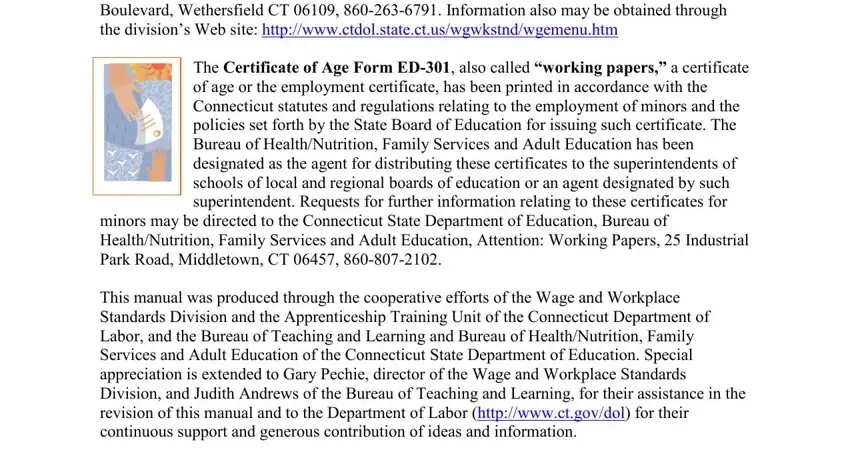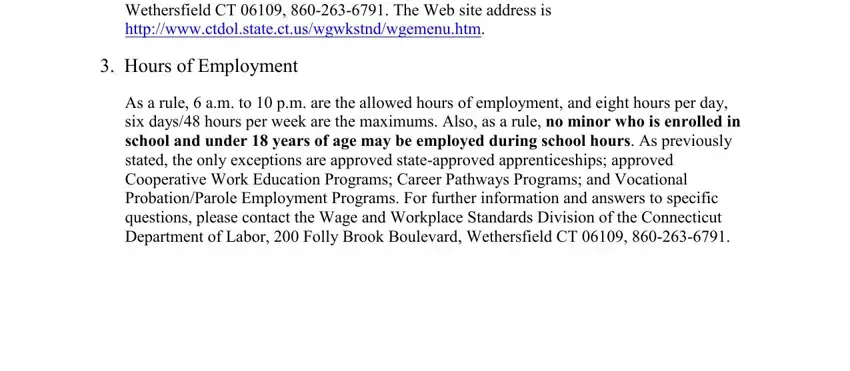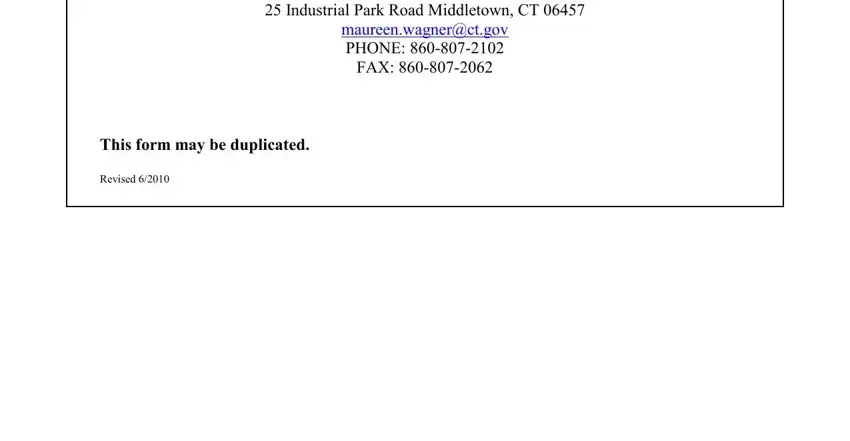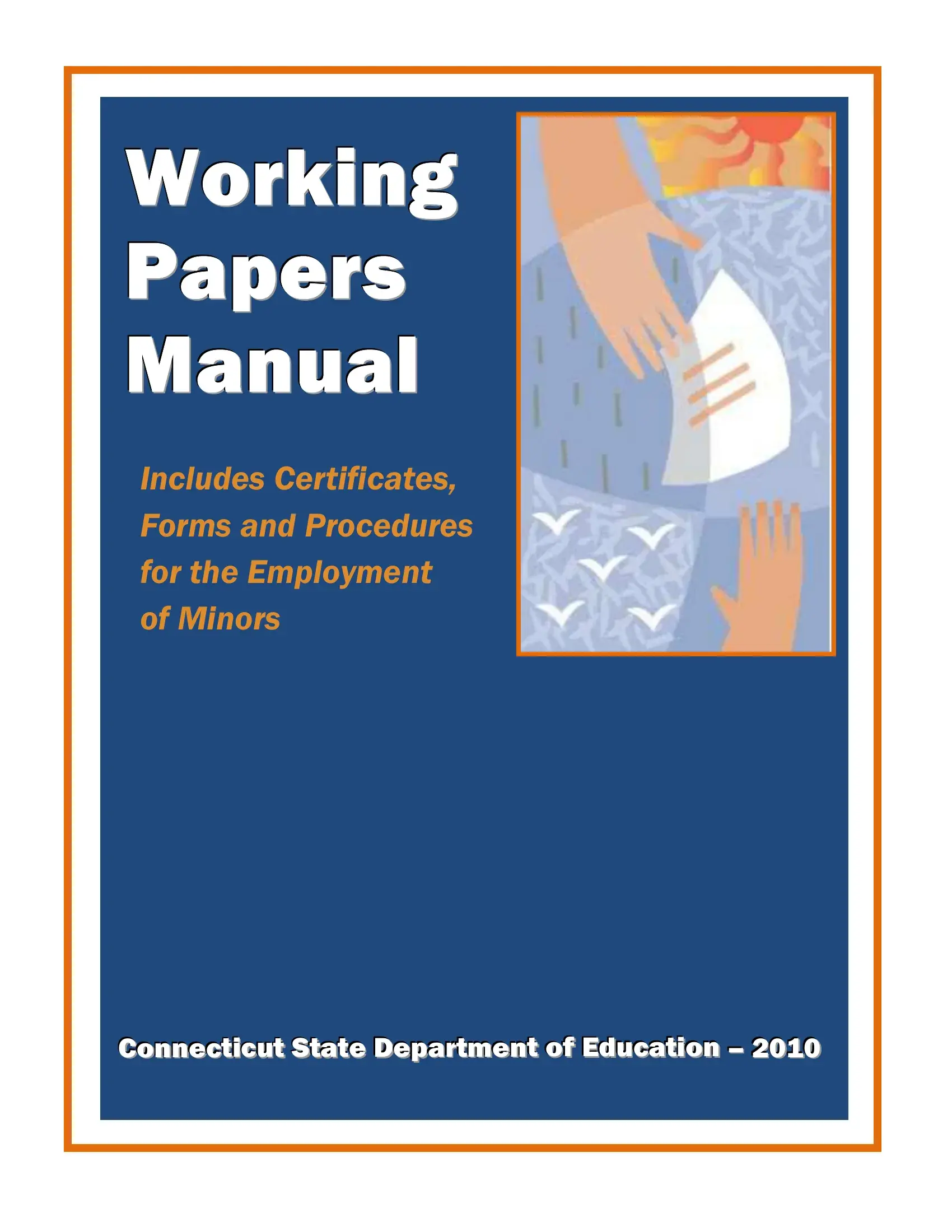Working
Papers
Manual
Includes Certificates, Forms and Procedures for the Employment of Minors
ConnecticutState DepartmentofEducation – 2010
Connecticut State
Department of Education
Mark K. McQuillan, Commissioner
George A. Coleman, Deputy Commissioner
Division of Family and Student Support Services
Charlene Russell-Tucker, Associate Commissioner
Bureau of Health, Nutrition, Family Services and Adult Education
Paul Flinter, Chief
Maureen Wagner, Education Consultant
Idalia Thayer, Processing Technician
Bureau of Teaching and Learning
Harriet Feldlaufer, Chief
Judith Andrews, Education Consultant
Office of Media, Planning and Constituent Services
Deborah Koval, Designer
Preface.......................................................................................................................................
Part A – Certificate of Age Form ED-301: Working Papers
General Requirements for Issuance
1.Purpose and Prerequisites for the Certificate of Age Form ED-301
2.Criteria for Issuing a Certificate of Age Form ED-301...............................................................
3.Authentic Documentation/Evidence of Age ...............................................................................
4.Notarized Affidavit of Parent .....................................................................................................
5.Written Promise of Employment ................................................................................................
6.Limitations of the Certificate of Age Form ED-301 ..................................................................
7.Employment Not Requiring Certificate of Age Form ED-301 ..................................................
8.Apprenticeship Programs ...........................................................................................................
9.Career Pathways/Cooperative Work Programs ......................................................................................................................
General Operational Procedures |
|
1. |
Local Program Operations |
6 |
2. |
Obtaining the Electronic Working Papers Form |
6 |
3. |
Preparation of the Certificate of Age Form ED-301 |
6 |
4. |
Designation of Agent Form |
7 |
5. |
Maintenance of Records |
7 |
6. |
Programs of Job Training and Work Experience |
7 |
Part B - Other Connecticut Employment Certificates |
|
1. |
Agricultural Work Permit |
8 |
2. |
Apprenticeship Approval Card |
8 |
3. |
Vocational Probation/Parole Employment Permit |
8 |
4. |
LED 75-1 Hazardous Occupations |
8 |
Part C – Restrictions on the Employment of Minors |
|
1. |
Hazardous Employment |
10 |
2. |
Wages |
10 |
3. |
Hours of Employment |
10 |
4. |
Employment Involving a Motor Vehicle |
12 |
5. |
Exemption from Child Labor Laws |
12 |
Appendices |
|
A. Sample Certificate of Age Form |
13 |
B. Request for Electronic Form |
14 |
C. Promise of Employment (Sample) |
15 |
D. Partial Listing of Approved Apprenticeship Programs |
16 |
E. Working Papers Designation of Agent Form |
17 |
F. Vocational Permit with Supporting Documents |
18 |
G. LED 75-1 |
21 |
H. Listing of Selected Connecticut General Statutes and Regulations Governing the Employment of |
23 |
Minors |
|
I. Regulations of State Agencies, Employment of Minors - Sec. 31-23-1 |
25 |
Working Papers Manual - i
Preface
Our state and federal governments have enacted laws relating to the employment of minors for the equal protection of both minors and their employers. The minor is prohibited from performing harmful or hazardous work. The employer is protected from placing a minor into employment based on falsified information.
The Connecticut laws listed in this procedural manual cannot be all-inclusive, as many new laws are passed annually. The same applies to federal laws. Also, please note that, in addition to the education laws, this manual includes laws from other titles of the Connecticut General Statutes. They have been selected on the basis of their relevance to the employment of minors. You will need to refer to sections of the Connecticut General Statutes that have not been included. If you need further information relating to labor laws, you may direct your questions to the Wage and Workplace Standards Division of the Connecticut Department of Labor, 200 Folly Brook Boulevard, Wethersfield CT 06109, 860-263-6791. Information also may be obtained through the division’s Web site: http://www.ctdol.state.ct.us/wgwkstnd/wgemenu.htm
The Certificate of Age Form ED-301, also called “working papers,” a certificate
of age or the employment certificate, has been printed in accordance with the
Connecticut statutes and regulations relating to the employment of minors and the
policies set forth by the State Board of Education for issuing such certificate. The
Bureau of Health/Nutrition, Family Services and Adult Education has been
designated as the agent for distributing these certificates to the superintendents of
schools of local and regional boards of education or an agent designated by such superintendent. Requests for further information relating to these certificates for
minors may be directed to the Connecticut State Department of Education, Bureau of Health/Nutrition, Family Services and Adult Education, Attention: Working Papers, 25 Industrial Park Road, Middletown, CT 06457, 860-807-2102.
This manual was produced through the cooperative efforts of the Wage and Workplace Standards Division and the Apprenticeship Training Unit of the Connecticut Department of Labor, and the Bureau of Teaching and Learning and Bureau of Health/Nutrition, Family Services and Adult Education of the Connecticut State Department of Education. Special appreciation is extended to Gary Pechie, director of the Wage and Workplace Standards Division, and Judith Andrews of the Bureau of Teaching and Learning, for their assistance in the revision of this manual and to the Department of Labor (http://www.ct.gov/dol) for their continuous support and generous contribution of ideas and information.
Working Papers Manual - ii
PART A – Certificate of Age Form ED-301
General Requirements for Issuance
It is necessary to have specific requirements in order to ensure that there is an effective and timely process in the issuance of the Certificate of Age Form ED-301 to minors
seeking employment. The following requirements are designed to assist the designated issuing officer in this process.
1. Purpose and Prerequisites for the Certificate of Age Form ED-301
The purpose of the certificate of age as outlined in Sec. 10-193 of the Connecticut General Statutes is to ensure that individuals under the age of 18 have proper documentation of their age and are employed in occupations that are acceptable under the law.
Connecticut issues the Certificate of Age Form ED-301 to:
minors 16 and 17 years of age who desire nonhazardous jobs in any manufacturing, mechanical, service recreation, amusement, restaurant or mercantile establishment; minors 15 years of age who desire nonhazardous jobs in any mercantile establishment; and minors over 14 years of age who wish to work as a caddie or in a pro shop at any municipal or private golf course.
The Certificate of Age Form ED-301 (Appendix A) is used as a verification of a minor’s legal age for employment purposes. The superintendent of schools of any local or regional school district or an agent designated by the superintendent shall issue the Certificate of Age Form ED-301 to any resident minor who desires employment and has met all the requirements for being issued a Certificate of Age Form ED-301. This employment certification is also commonly referred to as “working papers.”
All issuing officers of any local or regional school district must adhere to the following minimum requirements in performing their duties as issuing agents of the Certificate of Age Form ED-301:
•All supporting documents submitted must be authentic and not altered or erased.
•Under no circumstances should a certificate be issued before a minor has reached the exact age required by law.
•The Certificate of Age Form ED-301 must be completed in triplicate: one copy for the minor, one copy for the employer, and one copy for the issuing officer’s files.
•The Certificate of Age Form ED-301 must be signed by the issuing officer in the appropriate place.
•The issuing officer must maintain a file for each minor who has applied for or has received a Certificate of Age Form ED-301.
•The file should contain at least a copy of the signed Certificate of Age Form ED- 301, a copy of the signed Promise of Employment and other supporting documents, e.g., birth certificate, baptismal certificate, driver’s license, etc.
•The issuing officer must follow the criteria for issuing a Certificate of Age Form ED-301 as noted on the following page.
Working Papers Manual - 1










